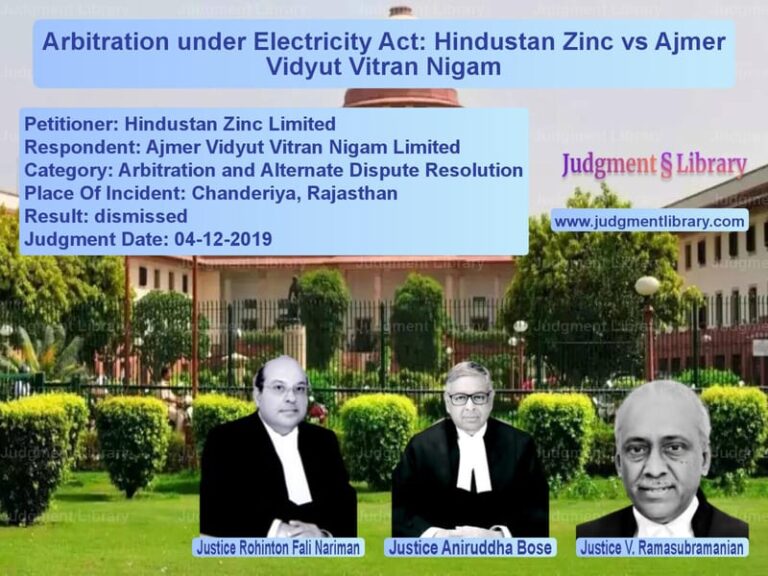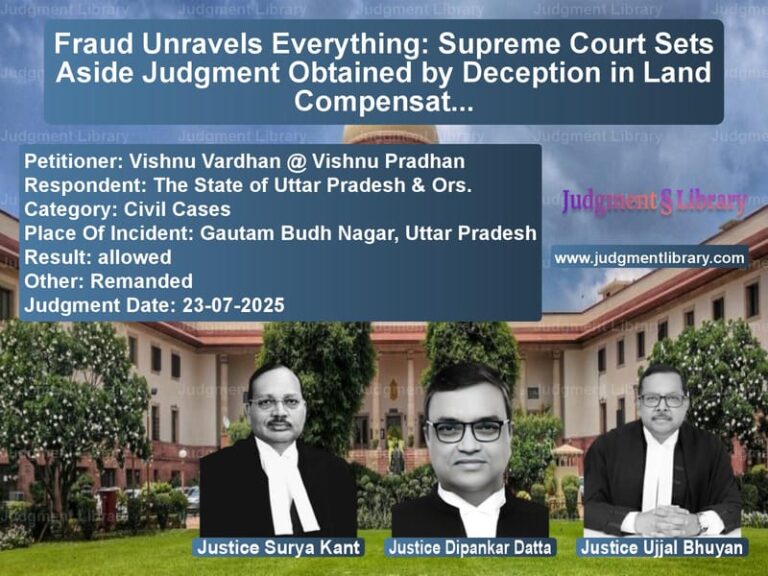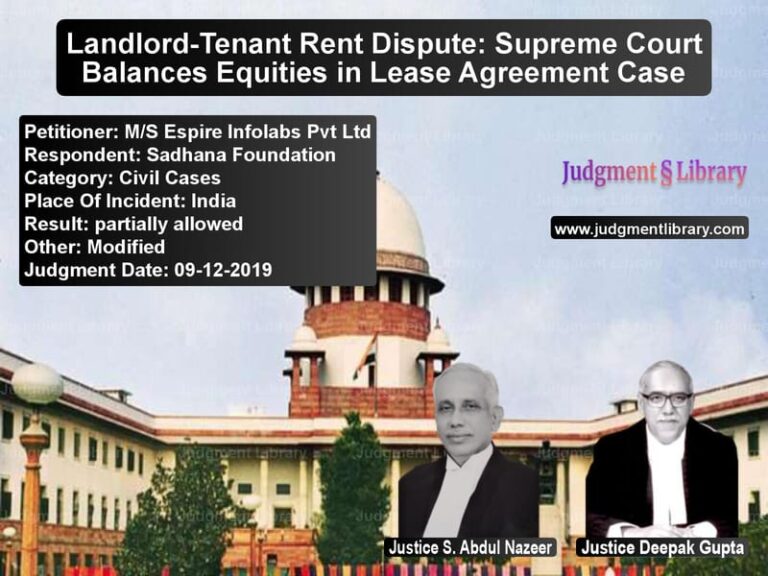Criminal Proceedings and Section 482 CrPC: Supreme Court’s Ruling on Inherent Powers of High Court
The Supreme Court of India, in the case of Prabhu Chawla vs. State of Rajasthan & Anr., addressed a significant issue related to the exercise of inherent powers under Section 482 of the Code of Criminal Procedure (CrPC). The case revolved around whether the availability of an alternative remedy under Section 397 CrPC (revision petition) barred an accused from seeking relief under Section 482 CrPC.
Background of the Case
The appeals before the Supreme Court arose from the Rajasthan High Court’s dismissal of petitions under Section 482 CrPC. The High Court, in its judgment, held that since an alternative remedy under Section 397 CrPC was available, the petitions under Section 482 CrPC were not maintainable. The ruling was based on a previous judgment in Sanjay Bhandari v. State of Rajasthan, which stated that an application under Section 482 CrPC could not be entertained when a revision petition under Section 397 was available.
The appellants challenged this ruling, arguing that the High Court misinterpreted the scope of inherent powers under Section 482 CrPC. The Supreme Court took up the appeals to resolve the conflict in judicial interpretations of the law.
Legal Issues in the Case
The case raised critical legal questions:
- Whether the availability of a remedy under Section 397 CrPC prevents an accused from invoking Section 482 CrPC.
- Whether the Rajasthan High Court erred in dismissing the petitions under Section 482 solely on the basis that a revision petition was available.
- Whether the judgment in Mohit alias Sonu v. State of Uttar Pradesh correctly interpreted the limitations on Section 482 CrPC.
- The scope of the High Court’s inherent powers under Section 482 CrPC in preventing abuse of process and securing justice.
Arguments of the Petitioners (Prabhu Chawla & Others)
The petitioners, represented by senior counsel, argued:
- The High Court erred in ruling that the availability of a revision petition under Section 397 CrPC barred the exercise of inherent jurisdiction under Section 482.
- Section 482 CrPC is an independent provision meant to prevent abuse of process and to secure justice.
- Several Supreme Court rulings, including Dhariwal Tobacco Products Ltd. v. State of Maharashtra, held that merely because a revision petition is available, it does not bar an application under Section 482 CrPC.
- In extraordinary cases, the High Court must exercise its inherent jurisdiction to quash criminal proceedings even if an alternative remedy exists.
Arguments of the Respondents (State of Rajasthan & Anr.)
The respondents countered these arguments with the following points:
- The Rajasthan High Court correctly applied the ruling in Mohit alias Sonu v. State of Uttar Pradesh, which held that when an order is not interlocutory, and revision under Section 397 is available, Section 482 should not be invoked.
- The High Court should not entertain Section 482 petitions unless exceptional circumstances exist.
- Allowing petitions under Section 482 when revision is possible under Section 397 would lead to judicial chaos and undermine the procedural framework of the CrPC.
Supreme Court’s Analysis and Judgment
The Supreme Court reviewed conflicting precedents and clarified the scope of Section 482 CrPC. The Court held that the Rajasthan High Court had erred in dismissing the petitions on the sole ground of availability of an alternative remedy under Section 397 CrPC.
Key Observations by the Supreme Court
- Section 482 CrPC begins with a non-obstante clause, stating that “nothing in this Code shall be deemed to limit or affect the inherent powers of the High Court.”
- The inherent powers under Section 482 CrPC should be exercised sparingly but can be invoked when an alternative remedy is inadequate or does not meet the ends of justice.
- The High Court should not dismiss an application under Section 482 merely because a revision petition under Section 397 is available.
- The ruling in Mohit alias Sonu incorrectly limited the High Court’s inherent jurisdiction under Section 482 CrPC.
Key Excerpts from the Judgment
“A general principle pervades this branch of law—when a specific provision is made, easy resort to inherent power is not right except under compelling circumstances. Not that there is an absence of jurisdiction, but that inherent power should not invade areas set apart for specific power under the same Code.”
The Court further held:
“There can be no total ban on the exercise of inherent power where abuse of the process of the court or other extraordinary situations excite the court’s jurisdiction. The limitation is self-restraint, nothing more.”
Final Verdict
The Supreme Court allowed the appeals and set aside the Rajasthan High Court’s orders, directing it to reconsider the petitions under Section 482 CrPC. The Court stated:
“As a result, both the appeals, one preferred by Prabhu Chawla and the other by Jagdish Upasane & Ors., are allowed. The impugned common order dated 02.04.2009 passed by the High Court of Rajasthan is set aside, and the matters are remitted back to the High Court for fresh hearing of the petitions under Section 482 Cr.P.C. in the light of the law explained above.”
Impact of the Judgment
This ruling reinforces the principle that the inherent powers of the High Court under Section 482 CrPC remain intact despite the availability of a revision remedy under Section 397 CrPC. It ensures that High Courts do not mechanically dismiss petitions under Section 482 solely based on the presence of an alternative remedy.
Conclusion
The Supreme Court’s decision in Prabhu Chawla vs. State of Rajasthan is a landmark ruling clarifying the scope of Section 482 CrPC. By setting aside the Rajasthan High Court’s restrictive interpretation, the judgment reaffirms that inherent powers must be exercised judiciously to prevent abuse of process and secure justice.
Don’t miss out on the full details! Download the complete judgment in PDF format below and gain valuable insights instantly!
Download Judgment: Prabhu Chawla vs State of Rajasthan & Supreme Court of India Judgment Dated 05-09-2016-1741883686459.pdf
Direct Downlaod Judgment: Direct downlaod this Judgment
See all petitions in Bail and Anticipatory Bail
See all petitions in Fraud and Forgery
See all petitions in Attempt to Murder Cases
See all petitions in Judgment by J. Chelameswar
See all petitions in Judgment by Shiva Kirti Singh
See all petitions in Judgment by Abhay Manohar Sapre
See all petitions in allowed
See all petitions in Remanded
See all petitions in supreme court of India judgments September 2016
See all petitions in 2016 judgments
See all posts in Criminal Cases Category
See all allowed petitions in Criminal Cases Category
See all Dismissed petitions in Criminal Cases Category
See all partially allowed petitions in Criminal Cases Category







